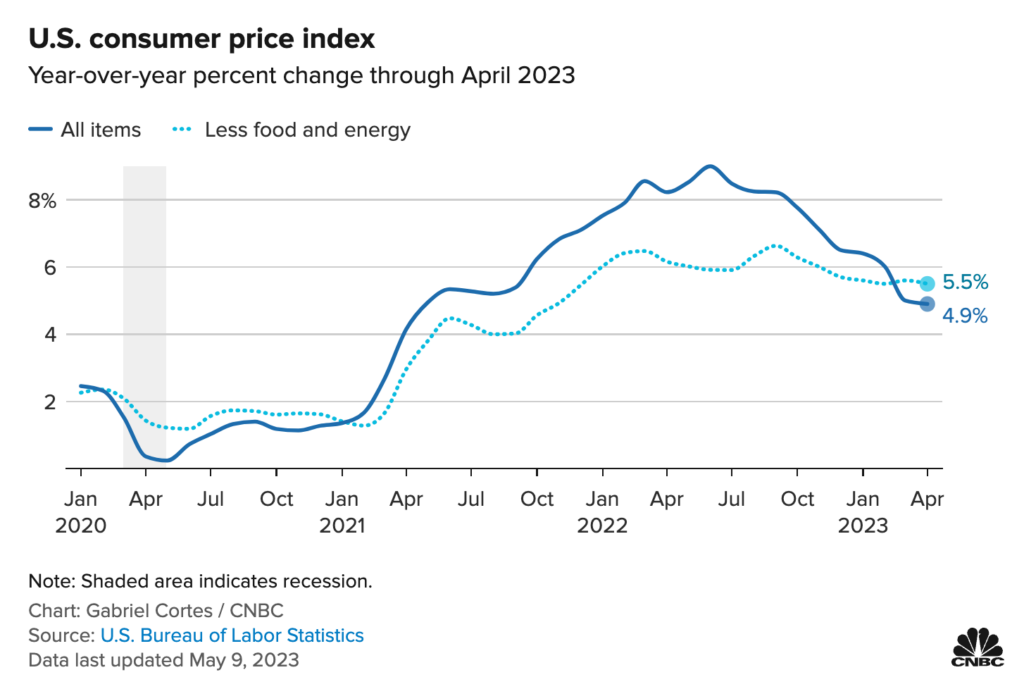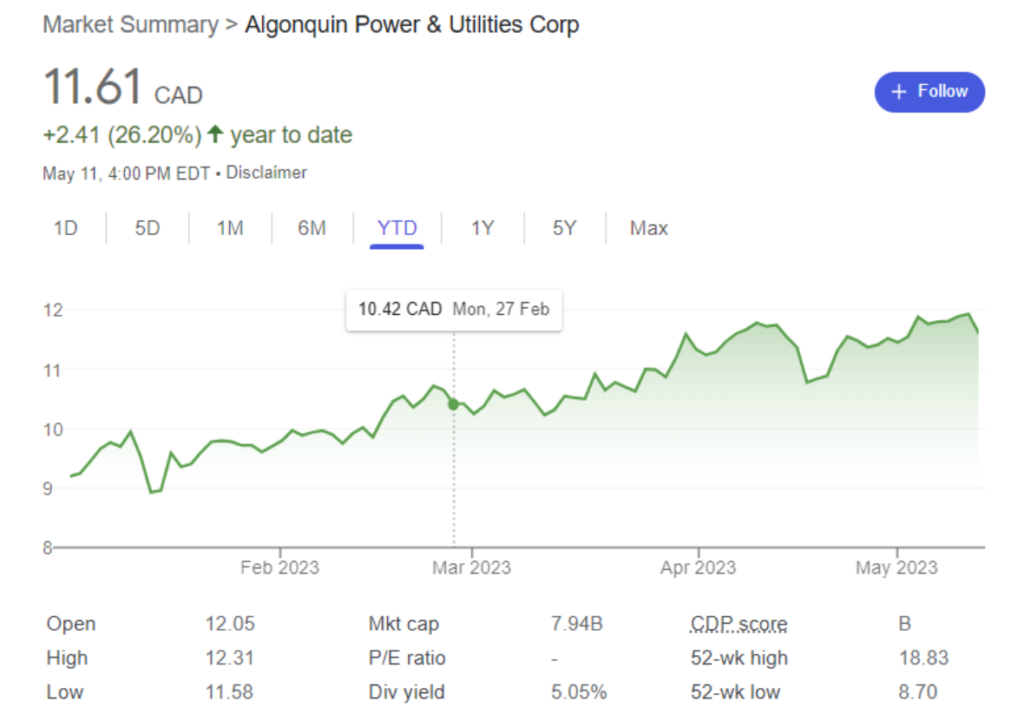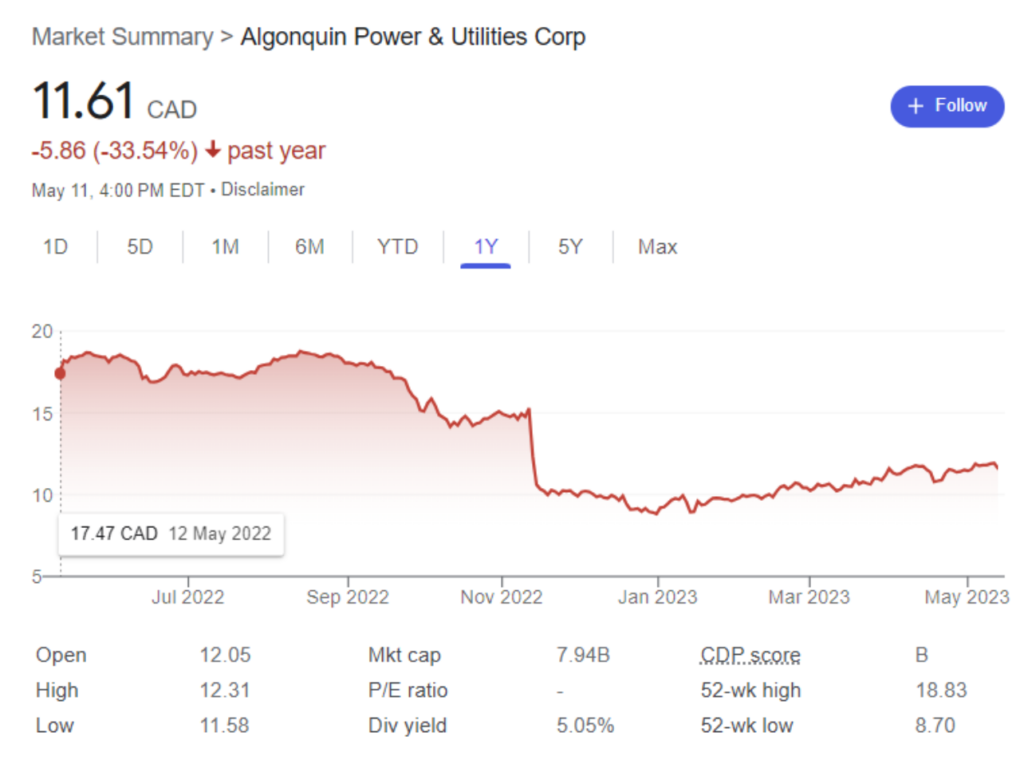Making sense of the markets this week: May 14, 2023

Presented By
Harvest ETFs
U.S. inflates more slowly, China deflates, American earnings still strong, Canadian pipelines deliver as expected, Algonquin breaks up with Kentucky Power.
Advertisement

Presented By
Harvest ETFs
U.S. inflates more slowly, China deflates, American earnings still strong, Canadian pipelines deliver as expected, Algonquin breaks up with Kentucky Power.

Kyle Prevost, editor of Million Dollar Journey and founder of the Canadian Financial Summit, shares financial headlines and offers context for Canadian investors.
Despite the strong April jobs report in the United States, overall inflation continued to trend downward in March. Wednesday’s U.S. Labour Department report revealed that the Consumer Price Index (CPI) rose 0.4% from April and increased at an annualized rate of 4.9%. This less inflationary figure was welcomed by macroeconomic policy watchers as it was slightly below the predicted 5% inflation rate. The lowered inflationary momentum is evidence that markets are moving back towards more of a balance between supply and demand.
That said, the inflation news isn’t all positive. Continuing the recent trend, core inflation (that is, excluding food and energy) is up 5.5% from a year ago. With core inflation still coming in far above the 2% target, there will no doubt be more debate over what moves the Federal Reserve should make next. Bond markets dipped slightly lower on the moves, indicating investors are tentatively liking the chances that this may be as high as interest rates are likely to go. The Fed’s decision to raise interest rates last week may well look like overkill in hindsight given the solid disinflationary trend that is evident.

Increases in the cost of shelter, gasoline and used cars were cited as key drivers of inflation for the month, while fuel oil, new vehicles and food saw lower price increases.
In international news, China may soon face a much different macroeconomic issue than most western nations are confronting. The Chinese National Bureau of Statistics reported a deflation rate (negative price movement) of 0.1% from March to April. The current 12-month inflation rate is only 0.1%, and speculation of deflationary cycles and slower economic growth is a real worry for the world’s second-biggest economy. Wholesalers saw prices fall by 3.6%, indicating this deflationary trend is not going anywhere soon. Insufficient demand caused by weak labour and property markets were cited as the main causes of the deflationary environment.
Recession headlines and doomsday scenarios have dominated business news since I started writing this column about a year ago. I’ve consistently said that while GDP growth numbers aren’t great, investors shouldn’t panic, as large corporations are still really good at making money.
That truth continued to reveal itself this week in the United States (all figures in U.S. dollars):
Despite these better-than-expected earnings reports, share prices of all four companies were down, based on acknowledged future headwinds and decreased growth rates. Paypal and Airbnb notably suffered double-digit share price drops.
While investors may be quite skeptical, nearly 80% of U.S. companies have beaten earnings estimates so far this quarter. With a strong labour market to support domestic consumption, one would assume there is a fairly high floor as far as corporate profits go for the immediate future.
Enbridge, TC Energy and Keyera also reported earnings this week, and they were largely in line with what analysts had predicted; as a result, all three pipeline shares were up between 1% and 2% over the last five trading days.
Looking ahead, next quarter’s profits may not be quite so uplifting, as Alberta’s wildfires continue to have widespread human and economic consequences. Nearly 30,000 residents have been evacuated, and 109 fires have already affected energy production. This will clearly have an impact on companies’ bottom lines.
You can read more of my thoughts on Canadian pipeline stocks at MillionDollarJourney.com.
Perhaps no single stock on the Toronto Stock Exchange has generated more surprise over the last year than Algonquin Power (AQN/TSX). Heading into 2022, the company was seen as a relatively stable combination of utility provider and renewable energy generator. Then, last November, interest rate realities finally hit, and all that debt-fuelled growth didn’t look quite so shiny.
This week, Algonquin announced solid earnings-per-share numbers of $0.17 (versus $0.16 predicted) and quarterly revenues of $778.6 million (versus $733.7 million predicted). Despite the slight outperformance relative to expectations, shares were down 2.68% on Thursday.
Algonquin’s share price history is a great example of how numbers can be manipulated to tell completely different stories. For example, I could tell you that the company was severely oversold and has had incredible momentum this year…

Or I could tell you that Algonquin shareholders are still suffering from having the wool pulled over their eyes, and management has a long way to go to get back to their previous trustworthy status.

The most important recent news for Algonquin is the breakup of the Kentucky Power acquisition. Algonquin’s president and CEO, Arun Banskota, addressed this transaction in the beginning of the earnings call, saying, “Last month, we announced with AEP a mutual termination of agreement to acquire Kentucky Power Company and AEP Kentucky Transmission Company. This was not an easy decision. However, our board of directors and management team decided that, given the challenging and continuously evolving macroeconomic environment and regulatory uncertainty over a final order, it was in the best interest of the company to terminate the transaction.”
In fact, the details of this deal falling through are probably the primary catalyst for the recent rise in Algonquin’s stock value. A quick look at the deal-that-was-not-to-be:
While it looks like the days of supercharged growth are behind them, Algonquin’s management now appears more focused on creating more durable long-term value for shareholders.
Kyle Prevost is a financial educator, author and speaker. When he’s not on a basketball court or in a boxing ring trying to recapture his youth, you can find him helping Canadians with their finances over at MillionDollarJourney.com and the Canadian Financial Summit.
Share this article Share on Facebook Share on Twitter Share on Linkedin Share on Reddit Share on Email